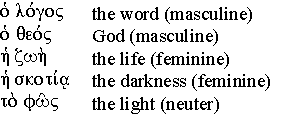
We have already defined nouns in a previous lesson, but let's repeat the definition here:
Nounsare words that describe people, places, or things. Here are some English nouns: book, person, chewing-gum, country, county, city, road, field, justice, peace, language, concept, man, woman, god, programmer, linguist. In the first lesson, we learned a few Greek nouns:

Articlesare those little words in front of the noun. In English, there are two articles: "the" is the definite article, and "a" is the indefinite article. Greek has only one article - since there are 24 forms for it, they couldn't afford a second one. The Greek article is definite, and it is often translated "the", but it functions very differently from the English "the". We will learn how the article functions and learn how to recognize 8 of the 24 forms in this lesson.
Positionmeans just what the word implies, and refers to the position with respect to the article and a noun. In Greek, the position of a word can drastically change its meaning, e.g. the word autoV, which we have translated "he" in our earlier chapters, can also mean "even" if it appears in the right position, so it is important to understand how position functions when you translate some words!
A full understanding of Greek nouns requires us to know some Greek nouns. Let's start by learning two sets of very common Greek nouns. Here is the first set:
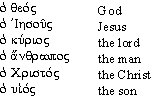
When you learn nouns, always learn the form of the article that goes along with it. Nouns may be masculine, feminine, or neuter, and if you do not know the gender of a noun, you will not know what grammatical forms it will take. These nouns are all masculine, because they take the masculine article.
Let's get out the good old gizmoand practice these nouns:
And now let's translate from English into Greek:
Now let's learn a second set of nouns:

Practice by translating the Greek into English:
And now translate the English back into Greek:
Articles and nouns both take different forms to show the function that they play in a sentence. We are now going to discuss the declension of nouns; we introduced essential concepts in the chapter on pronouns, and you will find it difficult to understand this section if you have not mastered the concepts in that chapter. Make sure that you understand about subjects, direct objects, and indirect objectsand that you remember how the Greek casesfunction with pronouns before you continue this section.
One of the big differences between Greek and English is that Greek articles and nouns take different forms depending on the case. In English, we use word order to determine who is doing what to whom, and the form of an article or a noun does not change when it is used as an object:
| The Lord | sees | the son |
| Subject | verb | direct object |
There is no way that I can think of to place "the son" first in this sentence without making "the son" the subject. In Greek, the form of the article and the noun tells whether it is used as a subject, direct object, or indirect object, and word order is less significant. Take a look at these sentences:
Subject first:

In each of these sentences, the subject is before the verb, and the object is after the verb. Note the following:
Now let's look at some sentences that have the object first:
Object first:

Note that the word order does not determine which noun is used as the subject. There is no way to translate the last two sentences into English without changing the word order around, which is unfortunate, because when the object is placed first in a Greek sentence, it places emphasis on the object, and it is often difficult to convey this emphasis in an English translation.
Except for four forms, the article is declined exactly like autoV, which you learned to decline in the chapter on pronouns. For comparison, here is the declension of autoV:
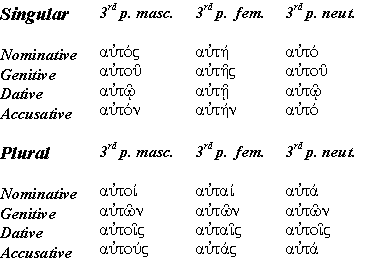
And here is the declension of the article:
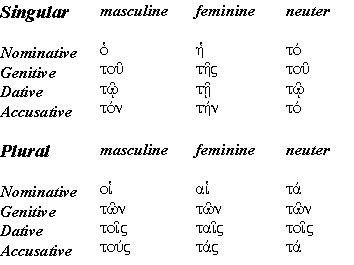
Except for the nominative singular and nominative plural forms, if you remove the au-from any form of autoV, you have the corresponding form of the article. In fact, this trick works for the neuter nominatives, too. Another thing that will help you remember these is that the dative forms all have iota or iota subscripts in the endings.
Note that some of the forms of the article are ambiguous. When you run into one of these, make sure that you consider all the possibilities!
| Ambiguous forms of the article | |
| to |
|
| ta |
|
| tou |
|
| tw_ |
|
| twn |
|
| toiV |
|
Experienced Little Greeks will not be surprised to learn that I'm going to get out the gizmoagain to help you learn the declension of the article. Since the window on the flashcards is too small to type all the possible meanings of some of the forms given in the above table, we will use the abbreviations; for instance, if the flashcard presents twn, the answer will show "gpm, gpf, gpn". In each of these three letter abbreviations, the letters stand for:
So in the above examples, "gpm" means (1) genitive (2) plural (3) masculine. Now let's do it!
And now let's try it in the other direction:
You have already encountered the Greek word logoV, which means "word". Let's look at the forms it takes for the different cases:

These forms are very similar to the forms that the masculine pronoun autoVtakes for these same cases. In fact, the masculine article also takes similar forms:
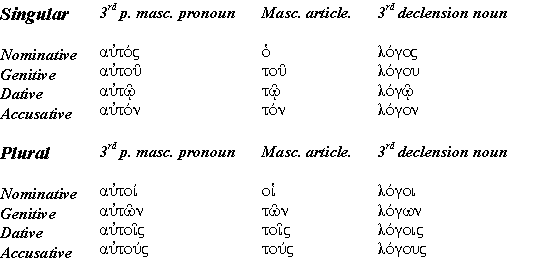
Except for the nominative forms of the article, these all have the same endings, differing only in accent. Pay careful attention to the breathing marks for the forms of the article - it will help you pronounce the forms correctly, and in some cases, these breathing marks are the only thing that will distinguish the article from other common words.
Let's practice the article and noun forms together:
And now let's translate from English into Greek:
Whenever a noun has an article, the article agrees with the noun in number, gender, and case:
When a noun is a subject, it appears in the nominative, and agrees with the verb in number, just as pronouns do:
In the lesson on pronouns, we pointed out that, pronoun subjects also agree with their verbs in person, as in the English example "we are". Nouns do not have person, so this is not relevant.
Let's practice by filling in the nouns in some verses:
In this verse, "the Lord" is the subject of the sentence. Add the Greek words for "the Lord" to this sentence and say it out loud. Remember to use the nominative:
Remember that the subject agrees with the verb. What verb does "the lord" agree with?
In the following verse, "the man" stands for people in general. Add in the nominative form for "the man" or "the person":
Even though you do not know the word for "bread" or "alone", you should recognize the case that is being used for these two words if you look at the ending. Which case is it?
What verb does "the man" agree with?
"Jesus" is the subject of this phrase; remember to add "the" as well as "Jesus" to this sentence:
Do you recognize the case of autw_? In this sentence, legeiis in the present tense, but is used as a historical present. See the discussion of John 1:29if you have forgotten about the historical present.
"The word" is the subject of this sentence. Add the Greek. Where is the verb that agrees with "the word"?
In the following verse, the word "brother" occurs twice, once as a subject, and once as a direct object:
In English, there is no way to distinguish "brother" used as a subject from "brother" used as a direct object, but in Greek, the forms of the nouns make it clear that adelfoVis the subject, the one who is betraying, and adelfonis the direct object, the one being betrayed. If you do not understand the function of the nominative and accusative cases for these two nouns, the sentence would be completely unintelligible.
Use the accusative case for the following. Will God see them, or will they see God?
Remember to use the plural in this one:
In the following examples, fill in the missing nouns, which are dative:
The gloss "have read" in this verse means that the recipients should have the letter read to the brothers, not that the brothers have all read the letter. What case would be used for "the brothers" if the verse said that they have all read the letter? (Note: the form of the verb would also have to change, but you don't know that yet...)
In this verse, "Christ", "Jesus", and "God" are all genitive:
In this verse, note that the plural is used - "heavens", not "heaven". The article will also need to be plural: